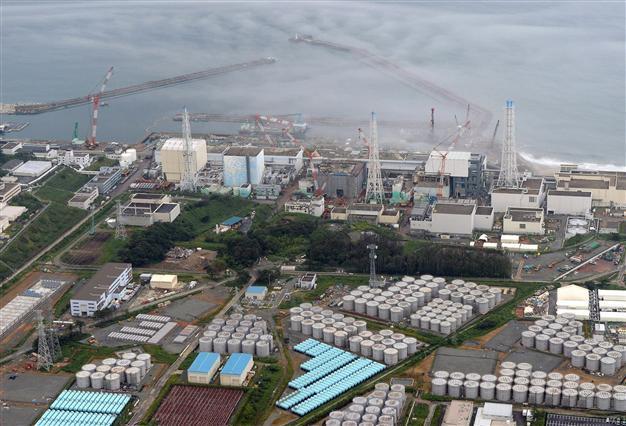Japan upgrades Fukushima leak to level three 'serious incident'
TOKYO - Agence France-Presse

This Tuesday, Aug. 20, 2013 aerial photo shows the Fukushima Dai-ichi nuclear plant at Okuma in Fukushima prefecture, northern Japan. AP Photo
Japan's nuclear regulator upgraded a radioactive water leak at the crippled Fukushima plant to a level three "serious incident" Wednesday, its highest warning in two years, as the operator scrambled to contain the impact on the environment.
The re-evaluation came a day after operator Tokyo Electric Power Company (TEPCO) said some 300 tonnes of radioactive water was believed to have leaked from a tank at the Fukushima Daiichi nuclear power plant. It is the worst such leak since the crisis began in March 2011 when a quake-generated tsunami knocked out reactor cooling systems and sparked meltdowns.
Japan's Nuclear Regulation Authority raised the assessment from level one, which means "anomaly" on the UN's International Nuclear Event Scale (INES).
The scale runs from zero to seven with seven being the worst.
Level three cases on the INES scale are described as "serious incidents" with "exposure in excess of ten times the statutory annual limit for workers".
The nuclear crisis at Fukushima two years ago is one of only two events classified as level seven -- the other being the Chernobyl disaster a quarter of a century ago.
TEPCO said the leak was believed to be continuing on Wednesday and it had not yet pinpointed the source of it, while there were no significant changes in radiation levels outside the plant.
"We are removing the soil contaminated with the leaked water, while sucking the remaining water from the troubled tank," a TEPCO spokesman said.
"We are trying our best not to spread the contamination to areas outside the facility, including the sea," he added.
TEPCO has faced a growing catalogue of incidents at the plant including several leaks of radioactive water, following the worst nuclear disaster in a generation.
The company -- which faces huge clean-up and compensation costs -- has struggled with a massive amount of radioactive water accumulating as a result of continuing water injections to cool reactors.
The embattled utility in July admitted for the first time that radioactive groundwater had been leaking outside the plant. This month it started pumping it out to reduce leakage into the Pacific.
The problems have led the Japanese government and its nuclear regulator to say they would get more directly involved in the cleanup at Fukushima, rather than leaving it to the operator.
While no one is officially recorded as having died as a direct result of the meltdowns of Fukushima's reactors, large areas around the plant had to be evacuated.
Tens of thousands of people are still unable to return to their homes.
